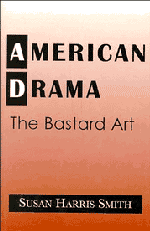Book contents
- Frontmatter
- Contents
- Acknowledgments
- 1 Introduction: The Problem of American Drama
- 2 Generic Hegemony: The Exclusion of American Drama
- 3 No Corner in Her Own House: What Is American About American Drama?
- 4 Did She Jump or Was She Pushed? American Drama in the University Curriculum
- 5 Caught in the Close Embrace: Sociology and Realism
- 6 Conclusion: Beyond Hegemony and Canonicity
- References
- Index
2 - Generic Hegemony: The Exclusion of American Drama
Published online by Cambridge University Press: 10 November 2009
- Frontmatter
- Contents
- Acknowledgments
- 1 Introduction: The Problem of American Drama
- 2 Generic Hegemony: The Exclusion of American Drama
- 3 No Corner in Her Own House: What Is American About American Drama?
- 4 Did She Jump or Was She Pushed? American Drama in the University Curriculum
- 5 Caught in the Close Embrace: Sociology and Realism
- 6 Conclusion: Beyond Hegemony and Canonicity
- References
- Index
Summary
“In the four quarters of the globe, who reads an American book? or goes to an American play?” queried Sydney Smith in The Edinburgh Review in 1820 (79). More to the point, who reads an American play? The evidence would suggest that few have or do. The question has to be, Why? Even though the American literary canon has been “busted,” the firm pronouncement from the pen of Dion Boucicault in 1890 that “there is not, and there never has been, a literary institution, which could be called the American drama” would provoke very little argument from most American critics more than a hundred years later (641). In fact, the neglect of American drama is so pervasive that Ruby Cohn, in her history of twentieth-century drama for the Columbia Literary History of the United States (1988), begins with the observation: “Given the chokehold on drama of a misnamed Broadway, given the lure of Hollywood, and given the power of some small-minded reviewers in the daily press, it is a virtual miracle that American drama merits admission to a history of American literature” (1101).
Despite its segregation from the main corpus of American literature, American drama has never been written in a vacuum. It has mirrored peculiarly American social, political, and historical issues in traditional as well as challenging forms and experimental styles. It has been the forum for a plurality of American voices. A reflexive cultural barometer, American drama has always responded to national and regional problems, either in reifying prevailing sentiments or by challenging dominant ideologies.
- Type
- Chapter
- Information
- American DramaThe Bastard Art, pp. 9 - 56Publisher: Cambridge University PressPrint publication year: 1997



